#sequel trilogy meta
Explore tagged Tumblr posts
Note
Do you think that Rey's story (excluding episode 9 'cause that was a shitshow) could be interpreted as a Cinderella/Ash girl story?
I hope you realize asking me this is like throwing chum to a shark 😈. But the short answer is yes, to a point.
The long answer is more complicated, so to begin with, let's consult the Cinderella bible:
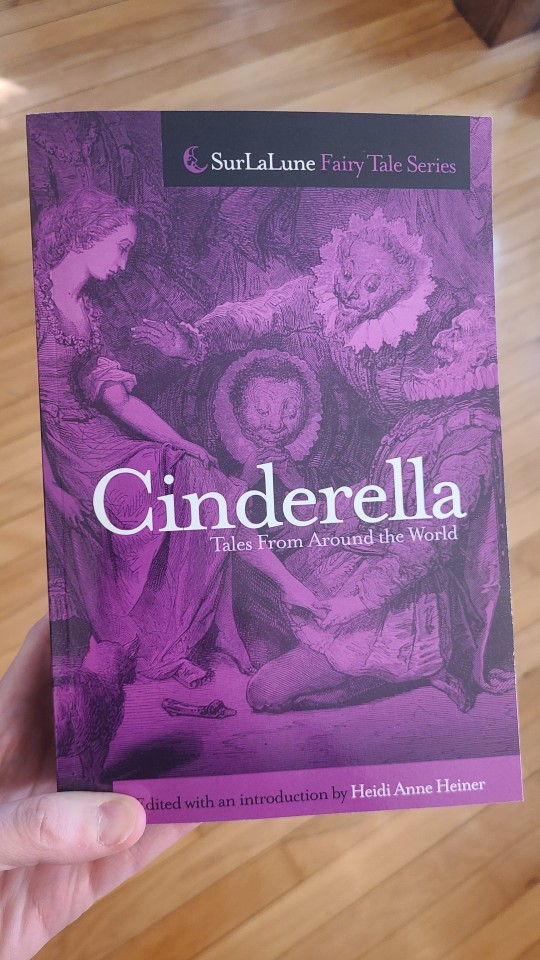
According to the Aarne Thompson Uther Index, there are five primary motifs to a Cinderella tale:
Persecuted heroine, usually by family
Help or helper, usually magic
Meeting the prince, usually with true identity disguised
Identification or penetration of disguise, usually by means of an object
Marriage to the prince
Rey is abandoned by her family, which is a form of persecution, and harassed by the inhabitants of Jakku like Unkar Plutt. Thus she clearly fulfills the first item.
As for meeting a helper, there are several for her, including Han Solo, Maz, Luke, and Leia. Any or all of these may be considered fairy godparents in the way that they offer her wisdom and material help. Further, except for Maz, they all die in the course of the story, which is consistent with many Cinderella tales in which the helper dies and their bones continue to offer wisdom and comfort to the heroine.
Next, meeting the prince. I mean
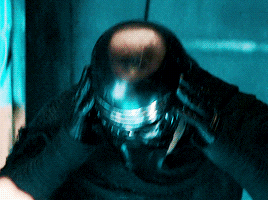
To the extent that Rey is "in disguise' here, it would be the extent of her force powers, her destiny as Ben Solo's dyad mate, and her role as the heir apparent to the Jedi (chosen by the Force to wield the legacy saber), all of which are obscured from Kylo Ren when he discovers her in the forest. Further, she is grimy and covered in desert sand, similar to how Cinderella is smeared with ashes that hide her true beauty.
So now an object penetrates the disguise. This is obviously the Skywalker lightsaber, which reveals Rey to be everything listed above, especially when she calls it to her on Starkiller Base, and again when she wields it on Ahch-to.
And lastly, marriage to the prince. As many others have pointed out over the years, Rey and Ben have almost too many symbolic marriages to count in the course of the sequel trilogy. They're extremely married, the Force said so.
BUT WAIT! Go back and look at that list again. Who ELSE fits all those criteria?
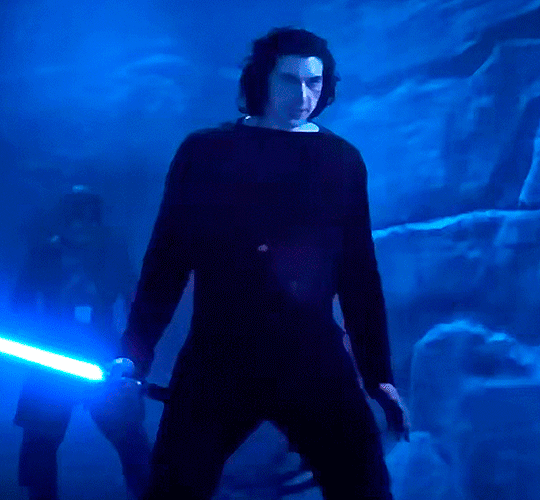
It's our boy! Consider:
He is indeed persecuted by family, most notably when Luke momentarily considers killing him.
Ben's helpers are both dark and light, as Snoke/Palpatine guide him in the dark while Luke guides him in the light (poorly). But note again what I said above about the bones of the mentor continuing to offer guidance and comfort after their death. Who should appear at Ben's lowest hour but his departed father, Han Solo? With a message of love, acceptance, and encouragement, Han's memory (because in fairy tales, bones contain memory) encourages Ben to at last cast off his beastly skin and become who he always was.
Next, meeting the prince/ss in disguise. He's wearing a literal mask when he meets Rey, so yeah.
An object penetrates the disguise? Rey slashed his face with the legacy saber, thus symbolically peeling away his mask. And I've argued before that the stabbing in TROS (which I still HATE, btw) is another cutting or burning away of the beastly skin.
And lastly, marriage to the prince/ss. As previously stated, that happened. Many times.
So yes, the Sequel Trilogy can definitely be considered a Cinderella story, with but one glaring issue: Cinderella's husband usually doesn't die at the end. But that's another topic that's been done to death, so let's all just read some more fanfic and forget about it. 👑 Thank you for the ask, this was fun!
#reylo#reylo meta#star wars#star wars meta#sw meta#star wars sequel trilogy#sequel trilogy#sequel trilogy meta#sw sequels#rey x ben#rey of jakku#ben solo#kylo ren#cinderella#aschenputtel#fairy tale#fairy tale meta#folktales#folktale types#folktale motifs#atu 510#aarne thompson uther#han solo#luke skywalker#leia organa#maz kanata#fairy godmother#my meta
103 notes
·
View notes
Text
The metaphysical mechanics of Anakin's Force Ghost are the single biggest mystery of the period between RotJ and TFA to me.
If he can Force Ghost, or at least sometimes, then what governs what he can and cannot do, and who he can or cannot speak with?
If he can appear to others the way Obi Wan, Qui Gon, Yoda, and eventually Luke can, it makes very little emotional sense unless something is blocking him.
I like to think that Anakin, in death, had enough respect for Leia not to appear to her. His actions killed her real mam and dad, the people who raised her into a kind, strong person with integrity in every step. He tortured her, he destroyed her homeworld and her culture. He wouldn't be so stupid as to think that a nice father-daughter chat would solve everything.
I like to think that he loves her from an observational distance, and brims with pride at every step she takes for the galaxy that he injured gravely and so nearly destroyed. So like Padmé, her justice-seeking Naberrie qualities nurtured like rare orchids by Bail and Breha, who were themselves so principled and just. Anakin might also see the ways in which she is not like any of the senators or royalty who made her who she is. He might want to take credit for the parts of her that are so brave, so impassioned, so willing to challenge any authority she sees as unworthy or unjust. Obi-Wan told her, when she was very young, that this was her inheritance from Anakin. But Leia doesn't want anything from him, and he understands. So he spends time watching, in grieving pride, at what his daughter became in spite of him.
I also like to think that at a certain point he would have to try, if he could, to intervene in what was being done to her family. In my heart there is no version of a redeemed afterlife Anakin who does not try to save another Skywalker child from what he went through.
He would have tried to materialise, blue-aura-lit and kind eyed, into the living room of a Chandrilla apartment, to try to soothe the terror and discomfort of a tiny child levitating cambiblocks and breaking glass in distress. He has far more experience with child murder than child rearing, but by the Force he'd damn well TRY.
It probably wouldn't work, and I think some of us fans (esp those who love the sequels or those who are more interested in the Skywalkers than the Disaster Lineage as a family) deserve to know why.
Why, in my headcannons, does Anakin spend years trying to send thoughts of 'no kiddo that isn't me, I'm me, your grandpa, and I can tell you that your mom and dad love you so much and that those other voices are full of bantha-poodoo, please trust me, please believe me, please hear me' out through the Force, only for them to never find their way to their intended recipient?
Why can he not appear to Leia and say, 'I know you don't want to talk to me and I don't want you to have to endure the distress of talking to me but it's about your kid. I can't make the past alright, but let me please give you the information you need to stop the cycle repeating'.
Why can't he warn Luke? 'There's a storm coming and the lightning is not natural. You have seen that lightning before, standing right by my side, and it comes from the same source. Our nephew dreams things that are not his own. Consider striking him and you will doom the world, but also our family. Don't let the Darkness guide you, its only goal is to make more Darkness.'
There are several potential answers, of course.
The first is that Anakin can get through but nobody listens. It's a steady stream of 'stay away from my child, stay away from my academy, don't corrupt our future with the evil of the past'. This option reflects negatively on Luke and Leia, but it also feels true to traumatised families. I'm a firm believer in the fact that Luke, Leia, and Han as having unwittingly done poorly by the next generation of their kin does not 'ruin' their characters, it makes them more sympathetic and human, and so it doesn't upset me if this is the option. It's bad parenting and good storytelling.
The most obvious answer is of course, Palpatine. He can block Anakin's access to the likes of Luke, Leia, and Ben. This means that a dead Palpatine is still torturing a dead Anakin. Excuse me while I cry for a thousand years. Now either this means that Palpatine thinks Ahsoka is small potatoes and it doesn't matter if Anakin can see her in the WBW, or that Anakin could only communicate with Ahsoka BECAUSE she could enter the WBW. So, considering that the Ahsoka show takes place after 'Last Shot', it still makes no sense that Anakin doesn't go 'please see what's going on with Leia's kid, I'm worried about her and about her lil guy.'
The third option is the one that I find genuinely upsetting. Not in-world upsetting, but what-are-they-doing-with-our-story upsetting. It's also the one I find the most likely:
DLF in general and Favroni in particular are pushing Disaster Lineage out in front, and trying to sublimate the Skywalkers. I see Ahsoka as Anakin's sister, and I don't think it is inappropriate for him to love her the same way he loves his children, his grandchild, or his brother Obi-Wan. It makes emotional sense for him to reach out to her, and love is not a finite resource.
But a set of wider storytelling choices is highlighting that the most important inheritance of the story is Yoda to Dooku to Qui Gon to Obi Wan to Anakin to Ahsoka to maybe Sabine, or Jacen Syndulla. I feel in some ways that shifting Anakin's attention, or the context in which we encounter him, may give the audience a sense of the greater legitimacy of the Disaster Lineage to the long term future of the galaxy.
I have ZERO problem with this being the thread by which Force training is maintained in the GFFA through the sequels and into the post-sequel era. I prefer it to watching my beloved Rey of Jakku doing it all alone.
I have a HUGE problem with the idea that we may never get more Skywalkers in context with one another. And more importantly, the idea that we really shouldn't care about what happened to them after Return of the Jedi. That the sequels don't matter.
Anakin is the greatest silence in the sequels. I suspect that they didn't get Hayden back because they were still nervous of prequel hate (sweet summer children that they were, not knowing that the penis-brains were gunning for them, too). Many of us hoped that the New Republic Era TV series would inflect upon the ST the way that Clone Wars inflected upon the PT.
So far it really hasn't.
#star wars meta#ahsoka spoilers#anakin skywalker#sequel trilogy meta#sequel trilogy#ben solo#skywalker family#leia organa#princess leia
26 notes
·
View notes
Text
I just NEED everyone to agree with me that Rey's parents are nobody. We should all agree about that. We should collectively, as an audience, say, "clearly the best idea was to have Kylo Ren be a dynastic heir to the major legends of the Force who wants to throw off his family's shadow, while his rival is nobody from nowhere who wants to belong--so we're going to stick with that."
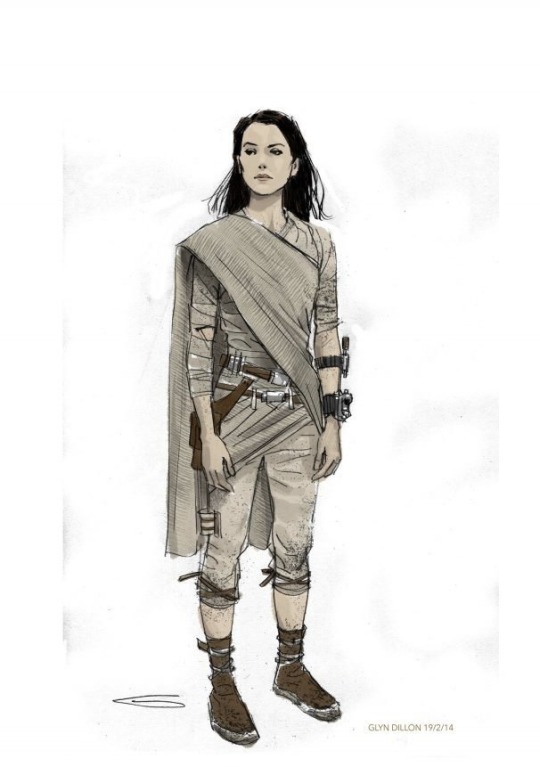
And then, what should have happened is, Rey can finish her story by being able to say, "My parents might have abandoned me, but that doesn't mean I'm worthless." And eventually Kylo Ren can say, "My family might have been powerful, but I don't have to be," and all those other things that they can bounce off of each other as great foils.
It can keep being a good story about accepting past failures and choosing to grow beyond them.
Let's just all collectively ignore Rey Skypatine because of how silly that was. I mean. If they can just ignore the setups in the previous movie, we can ignore their choices in the conclusion. Right?? Right? Tell me I'm right
#Rey#Rey Skywalker#Rey palpatine#Reylo#Kylo Ren#Ben solo#lucasfilm#Disney Star Wars#Star Wars#Star Wars sequels#Star Wars sequel trilogy#Rey nobody#Rey of jakku#Daisy Ridley#Adam driver#rian johnson#jj abrams#meta#the last Jedi#the rise of Skywalker#tros
3K notes
·
View notes
Text
I think about Star Wars a lot more than I post about Star Wars, and I've had some free time recently to type up some thoughts on Episode 7 that've been swirling around in my head for a couple of years. There were a few ideas and plot beats, and moments of apparent self-examination in Episode 7 which I thought were fairly compelling, even though they ultimately paid no dividends:
First was Finn’s character concept. “Star Wars as experienced from the perspective of a Stormtrooper undergoing a crisis of faith” is a rich hook; humanizing and giving a face to what's basically the platonic implementation of the faceless mook. Unfortunately, the potency of the arc was undercut by the pre-existing textual ambiguity as to what stormtroopers actually are. Star Wars extended canon has settled on the idea that each trilogy features an entirely novel cohort of white-clad mooks, each with a fundamentally different underlying dynamic. The clones and the First-Order forces are different flavors of slave army; in contrast, the stormtroopers are more frequently portrayed in the expanded universe as military careerists, stormtrooper being a thing you work up to rather than a gig for a fresh conscript. A slave-soldier who defects is a very different character from a military careerist who defects, and they invite different analysis. There's a bait-and-switch going on here, in that Finn gestures in the direction of the familiar OT stormtroopers but can't comment on or examine them because he's actually part of a novel dynamic invented for the new movies. And there's one final nail in the coffin here, signaled by the number of times I've had to invoke the expanded universe so far. When Finn debuted, the racists were of course, legion, but I also ran into a number of people who were sincerely confused as to why they'd recast Temuera Morrison. Going off the seven films that existed at the time, it wasn't unreasonable to read the prequel trilogy as an origin story for where the OT stormtroopers came from. Going only off the nine films that exist now, it still isn't unreasonable! It's muddied from so many different directions by their failure to establish the ground rules in the mainline films before they tried to put on subversive airs about it. I am still irritated by this.
Next up is how Han Solo was written. I actually liked the tack they took with him quite a bit. Because initially, right, his role in the movie is just to be Han Solo. He's back, and he hasn't changed! He's still kicking ass and taking names, he's still the lovable scoundrel you knew and loved from your childhood- and the principle cast members react to his presence with the same reverence the film's trying to invoke in the audience, they've grown up hearing the same stories about him. Except that episode 7, at least, is also very aware of the fact that if Han Solo is still recognizably the same guy thirty years on, it indicates that things have gone totally off the rails for him. We find out that the lovable rogue routine is the result of him backsliding, his happy ending blown up by massive personal tragedy rooted in communicative failures and (implicitly) his parental shortcomings. It feels deliberately in conversation with the nostalgic impulse driving the entire film- here's your childhood hero back just as you remember, here's what that stagnation costs. And it also feels like it's in conversation with what was a fairly common strain of Han Solo Take- the idea that Ep. 6 cuts off at a very convenient point, and that Han and Leia's fly-by-night wartime relationship wouldn't survive the rigors of domesticity. Obviously, that's not the only direction you can take with the character; the old EU basically threaded the needle of keeping Han recognizable without rolling back his character development gains. But it felt like they were actually committing to a direction, a direction that was aware of the space, and not a reflexively deferential and flattering one, which at the time I appreciated! The problem, of course, is that for it to really land, you need to have a really, really strong idea of what actually went down-of what Han's specific shortcomings and failures were. And given the game of ping-pong they proceeded to play with Kylo Ren's characterization, this turned out to be. Less than doable.
Kylo Ren is the third thing about Episode 7 that I liked. His character concept is basically an extended admission by the filmmakers that there's no way to top Vader as an antagonist. Instead, they lean into the opposite direction- they make him underwhelming on purpose. Someone who's chasing Vader's legacy in the same way any post-OT Star Wars villain is going to, pursuing Vader's aesthetic and the associated power without really understanding or undergoing the convoluted web of suffering and dysfunction that produced Vader. It's framed as a genuine twist that there's nothing particularly wrong with his face under that helmet. Whatever it takes to be Vader, he doesn't have it, and he knows that he doesn't have it, and the pursuit of it drives him to greater and greater acts of cartoonish villainy. The failure to one-up Vader is offloaded to the character instead of the writers, and it was genuinely interesting to watch. For one movie. The problem, of course, is that if the entire character archetype is "Vader, but less compelling," you can't try to give the bastard Vader's exact character arc. You can't retroactively bolt on a Vader-tier tragic backstory when you spent a whole movie signaling that whatever happened to him wasn't as compelling as what happened to Vader. You can't milk his angst for two more movies when it's the kind of angst on display in "Rocking the Suburbs" by Ben Folds!
There's a level on which I feel like Moff Gideon was a semi-successful implementation of Vader-Wannabe concept; he's the same kind of middling operator courting the Vader Aesthetic for clout, but he's doing it in the context of the imperial warlord era, where there's a lot of practical power available to anyone who can paint themselves to the Imperial Remnants as a plausible successor to Vader. Hand in Hand with this obvious politicking, Gideon is loathsome, which relieves the writers of the burden of having to plausibly redeem the guy; he's doing exactly what he needs to do and there'll never be a mandate to expand him beyond what his characterization can support. Unfortunately, the calculated and cynical nature of how he's emulating Vader precludes the immaturity and hero-worship elements on display with Kylo, which is unfortunate; the sincerity on display in Kylo's pursuit of authenticity is an important part of why he worked, to the extent that he worked at all, and it'd be worth unpacking in a better trilogy. As he stands Kylo is a clever idea, and that's all he is- he lacks the scaffolding to go from merely clever to actively good.
#and these are my unsolicited star wars thoughts#thoughts#meta#star wars#star wars sequel trilogy#kylo ren#moff gideon#han solo#star wars finn#star wars meta#sw sequels#the force awakens#analysis#effortpost
877 notes
·
View notes
Text
I feel like Star Wars missed the opportunity to make Darth Maul and Count Dooku beef. Like all there’s this conversation about Maul and Kenobi’s relationship but imagine being Count Dooku and you gotta live with the fact that the mf who killed your Padawan (one of the events that ended up making you align yourself with the Sith) is alive and living his best life. I would be so pissed. Sidious had to tell Count Dooku not to fuck with Maul bc I refuse that Dooku had no want to slide for Qui Gon Jinn
#star wars#sw#sw prequels#sw sequels#original trilogy#sw hc#sw headcanons#sw memes#sith order#sith#count dracula#darth tyranus#Darth maul#obi wan kenobi#maul opress#sheev palpatine#darth sidious#sw meta
977 notes
·
View notes
Text
Truly do think that the best thing the Sequel Trilogy could have done with regards to the Jedi--aka what Rian Johnson could have done instead of long visual gags and topless Kylo--would have been to reveal that the Sith came first.
That's the reveal that leaves Luke Skywalker depressed on Ach-To for years--to find the first Jedi Temple, the ancient texts, and instead of answers there is just the despair that the first Jedi were Sith. No hope, no guidance from Jedi long gone or renewed connection to a people and faith who have been all but lost. Simply an old man who has nowhere left to turn.
You don't even have to change TLJ's main plot, because that reveal paves the way for the doubt Luke is feeling. Is the darkness just inevitable? Why fight to build something when even the guardians of peace and justice began in darkness and empire?
The answer is, of course, because choice is just as powerful as destiny. The Jedi exist because a group of Sith looked around them and chose to be good. The galaxy is good, people can choose to be good. That's why they fight, why the Jedi can't end--because wherever darkness threatens to triumph, there will be those who choose to oppose it.
#i genuinely forget it isn't canon because it truly informs a lot of how i think about the jedi#not kotor#star wars#sequel trilogy#the last jedi#not quite a meta
66 notes
·
View notes
Text
Acolyte is going to age well, I'm telling you.
It's more true to Star Wars than the Sequels, because it's about the things that Star Wars has always been known for:
FAMILY – and the forces (both light and dark) that try to pull it apart.
In the Prequels, Anakin is constantly trying to protect his family: his mother, Padmé, Obi-Wan, the Chancellor. And it's his intense love toward his family that allows him to be manipulated into darkness, which ultimately tears his family apart.
In the Original Trilogy, the Skywalker family has been torn apart by darkness. But the ties of family between Vader, Luke, and Leia are strong, and it's family that saves Vader in the end.
And in Acolyte, we see a family torn apart by the Jedi, and two sisters constantly reaching for each other across space and time, but forces of darkness and justice get in the way.
In the Sequels there's this found family vibe, which in general is great, but in the movies you never get this sense that Rey holds any important family connection with anyone.
CORRUPTION – in others, the people you love, and in the institutions you trust.
In the Prequels, we see the corruption in the Senate, the corruption in the Jedi Order, and Anakin's corruption from light into dark.
In the Original Trilogy, we see the corruption of the Empire, but we also see the seeds of corruption from the old Jedi Order, with Yoda and Obi-Wan constantly telling Luke that he must kill his own father. We see Vader's corruption, and we see Luke unravel it.
In Acolyte, we see Mae corrupted by the dark side, we see Osha corrupted by her own feelings, and we see the Jedi corrupted by their own belief that they are the saviors of the galaxy, that they did the right thing.
In the Sequels, we see Luke, a Jedi, almost killing his nephew– this is absolutely corruption within the Jedi, but this is unbelievably out of character for Luke, who forgave his father, a mass murderer. We also see Ben Solo, but we never see him being corrupted by the dark side. We just see he's pretty much already there.
REDEMPTION – for those who seek it, and those who defy it.
In the Prequels, we are shown the path that takes Anakin into darkness.
And in the Original Trilogy, we are shown a man who defies his own redemption because he believes he does not deserve it, and that it's far too late– and yet he finds redemption anyway.
In Acolyte, almost every Jedi we're introduced to seeks redemption because of the terrible thing they've done, because of the secret they keep. I wouldn't say any of them are actually redeemed, but seeking redemption is an important part of this story for the Jedi characters.
In the Sequels… Yeah Ben Solo is redeemed but redemption isn't exactly a "theme" of the movies.
LOVE – complete, unconditional love, beyond reason.
In the Prequels, Anakin and Padmé share a love like this. Anakin doesn't deny killing younglings, and Padmé (while deeply upset and disturbed) does not stop loving him for what he's done.
In the Original Trilogy, Luke has never known his father, he doesn't have memories of a man who was once kind an honorable and good. All he knows is Darth Vader. And yet, he is willing to forgive his father because he loves him.
In Acolyte, Mae and Osha have both betrayed each other, have both done unspeakable things in each other's eyes, and yet their love for each other never falters. It remains, strong and forgiving, always.
In the Sequels… Is love a main "theme" of the Sequels? Yeah, Leia and Han love their son, but they've kind of given up on him and their marriage, Kylo Ren and Rey do not know each other well enough at all to be in love, and Luke apparently gave up on that unconditional love he got from his mother which allowed him to forgive his father. IDK love isn't a huge part of the Sequels.
POLITICS – I just need to point it out, almost every Star Wars movie or TV series that's actually good includes a lot of politics that's clearly explained and makes a lot of sense.
In the Prequels, we are introduced to the politics of the Galactic Republic, as well as the politics of the Jedi Order.
In The Clone Wars, there are whole story arcs based on politics (that whole arc about deregulating the banks?).
In the Original Trilogy, we hear about the Emperor's political maneuvers and how he's disbanded the Senate. We also come to understand the the Empire rules through fear, military might, and destruction of their opposition.
In Acolyte, we see Jedi politics play out, and we hear about how there are a few senators who do not trust the Jedi and the power they have.
What politics are we given in the Sequels? First Order, bad. Rebels good. And also repeat of the Original Trilogy. Oh, the New Order rules with military might and fear, and they have a Death Star thing. Okay? We've seen all this before.
*Disclaimer: When I'm talking about the Sequels, I'm talking about the movies, not the books. I have not read the books.
#my point: acolyte was great okay#acolyte is thoroughly true to star wars#Star Wars themes#Star Wars meta#darth jess#Star Wars acolyte#Star Wars prequel trilogy#Star Wars original trilogy#Star Wars sequel trilogy#anti sequel trilogy#anakin skywalker#padmé amidala#anidala#mae aniseya#osha aniseya#rey nobody#rey#obi wan kenobi#chancellor palpatine#sheev palpatine#yoda#empire#star wars#the clone wars#darth vader#ben solo#kylo ren#Luke skywalker#Leia skywalker#Leia organa
41 notes
·
View notes
Text
Torturing myself with ways Disney changed Star Wars - Violence & Strength part 2
A further follow to this https://www.tumblr.com/raleighrador/774909537693171712/a-final-thought-to-add-here-my-belief-is-that?source=share
If you like the sequels and specifically like Rey, you may want to skip this post. As a character I think she - as might be expected from the face of the sequel trilogy - is the purist distillation of how Disney fundamentally changed the narrative role of strength and violence, and power more generally.
I also think this broadly makes for an uninteresting character that has limited efficacy as part of a story, and is almost purely a marketing/fan service vehicle.
On violence and strength: Rey basically wins every single meaningful fight she gets into. Almost every physical confrontation is an illustration of how badass and competent she is. This is true throughout the trilogy.
In TFA her first confrontation is with Finn, a trained storm trooper raised from childhood to be a soldier. Rey effortlessly disarms him and gets him on the ground. Sure, she has a weapon and he doesn't but still.
Compare this with Luke's first few conflicts - he is knocked out by the Tuskens, he needs Ben to save him in the cantina.
There is the climactic fight with Kylo Ren. First, she "overpowers" Kylo and is able to snatch the lightsaber out of his Force grip, and then she defeats him in a duel. I know Kylo had been shot by Chewie but when I watch that scene I don't see anything that is meant to indicate he is operating at far below his best.
Again, compare this to either Luke or Anakin's first duels (after significantly more training). They both lose, badly, and are dismembered. Sure, Vader and Dooku are perhaps meant to be understood as far more powerful and dangerous than Kylo but the point remains.
Rey actually has limited fights in TLJ - but the throne room is clearly the most meaningful one. Again, pertinent observations: Rey (and Kylo) are able to defeat 8 Praetorian guards (who have the visual and contextual signal of "baddies you should worry about, not regular mooks"). Her and Kylo then again play tug of war with the lightsaber, and are evenly matched to the point that the saber gets ripped in half.
Again - Rey doesn't lose. In fact, we get a long lingering fight scene to show how cool and bass and good at fighting she is. She is tempted by Kylo, tempted by the dark side, and rejects it.
Completely unscathed, it is worth adding.
Again, compare this with Luke (tempted and mutilated by his father), or Anakin who gives in to the dark (on Tattooine and arguably on Geonosis) and is mutilated physically and spiritually in doing so.
Finally we get to TROS.
Rey's first "fight" is with Kylo where she destroys his TIE with a saber, then uses force lightning to destroy a ship (and maybe but turns out not actually kill Chewie).
Her second is the vision/teleport duel with Kylo across the ship and the planet. Again, it is a draw, Rey certainly doesn't lose.
She and Kylo duel again on the wreckage of the DS. Maybe Kylo is distracted but he certainly isn't winning, and Rey then stabs him (which is commonly believed to indicate someone "winning" a sword fight). She then Force heals him and saves his life.
On Exegol her and Ben Solo then murder their way through the Praetorians and Knights of Ren, before directly confronting Palpatine. The jeopardy in the narrative is created by the fact that if Rey kills Palpatine out of anger, she becomes a Sith, but if she doesn't kill him she dies and so does the Resistance. Rey then hears the voices of all the past Jedi - including, just in case we didn't get it, Anakin Skywalker telling her to bring balance to the Force like he did (did he?) - and magically teleports Ben's lightsaber so she can dual wield and redirect the lightning Palpatine is blasting and kill shim with that.
She then dies from the effort (before immediately being brought back to life by Ben).
Again, contrast this with Anakin's fight with Obi-Wan on Mustafar or Luke's confrontation with Vader on DS2. Anakin and Obi-Wan both lose on Mustafar - the mere act of engaging in violence empowers the Dark and ultimately completes the creation of Darth Vader.
Luke only wins by throwing down his saber, by refusing to meet violence with violence.
Lucas had a clear metaphysical logic that is reflected in the use and role of violence.
Violence has a cost. There is no escaping that. Violence is almost always wrong - even if you believe it to be right and approach it dispassionately. There is no just killing, not such that your soul can survive.
Luke and Anakin are - narratively - consistently punished for choosing violence. Every time they try and solve a problem with violence they lose a loved one, a body part, a piece of their soul.
The same is true - to a lesser degree - for Obi-Wan. He defeats Maul but loses Qui-Gon. His decision to follow Dooku results in his and Anakin's injuries and achieves nothing. He is the one who swings a saber through whatever limited remains of Anakin might exist and heralds the final birth of Vader.
Contrast this with the fight on the DS. Obi-Wan knows there is no victory in fighting Vader, but in refusing to fight, in sheathing his sword, he can achieve a power far greater than the Sith can imagine.
TLJ's final scene where Mirage Luke confronts Kylo is actually also consistent with this, and it's why it is in isolation some of my absolute favourite Star Wars.
TLJ is also very confusing while it DOES apply the same logic as Lucas to Luke (try and kill your sleeping nephew = bad, using the Force to distract the First Order while you never actually harm anyone = good) it doesn't to Rey or Kylo.
Disney - by contrast - certainly do not treat violence in the same way. In fact, Disney takes a starkly different view which is almost readable as "might makes right" or maybe more accurately "being right makes you mighty".
Rey is good and pure and therefore she wins all her fights. She is on the side of the Light and so cannot lose. Kylo Ren, by contrast, is Evil and so despite more training and experience he consistently loses. It is only when he fights for the right reasons - killing Snoke and his guards to help Rey, or saving Rey from Palpatine - that he wins.
This is... distinctly weird. How, for example, are we meant to reinterpret the original 6 films or the wider Star Wars universe with this logic? I take it Palpatine was mostly right?
What you might say is actually that violence has no narrative weight. Maybe. That is as much of a change from Lucas as anything else but it also significantly limits the ability to tell a story in the context of the medium of sci fi action movies.
And that is actually the point, I think. There is no meaningful narrative interpretation of violence in the Disney films. The fight scenes serve no real purpose - they do not represent crucibles in which characters develop and transform, nor do they provide any level or moral insight.
They are purely vehicles for a) cool cinematography (and to be clear, the Sequels are consistently BEAUTIFUL and the fights scenes are some of the best) and b) emphasising how awesome the poster girl is and how neat it would be if you bought Lego and action figures and and and.
#star wars#anakin skywalker#obi wan kenobi#luke skywalker#rey palpatine#rey#kylo ren#ben solo#star wars sequel trilogy#fibonacci sequence#sw prequels#star wars prequels#original trilogy#star wars original trilogy#sw ot#sw meta#the narrative role of violence
32 notes
·
View notes
Text
Timeline of Armitage Hux's Life
Excuse the formatting... tumblr has no idents and it makes this stuff impossible. Please let me know of any corrections and I will update this. I tried to be as accurate as possible, but some of these dates are guesswork (and thus have a span of years it might be).
1 BBY - Born to Brendol Hux & a kitchen woman on Arkanis
5 ABY -
Evacuates Arkanis with Brendol Hux
Is given protection by Rae Sloane
10-13 ABY - Has lost Sloane's protection/contact and is abused by Brendol again
Sometime before Parnassos - Becomes a General
27-29 ABY - Meets Brendol Hux at the crash sight on Parnassos, witnesses bombardment of the planet.
30 ABY -
Allows Phasma to kill Brendol
(with Phasma) recruits Jinata security to begin capturing infants for the stormtrooper program.
33 ABY - Marooned with Kylo Ren
33 ABY - Kills Admiral Brooks
34 ABY -
Events of TFA
Events of TLJ
Rumors spread about Snoke's successor, many (incorrectly) assume it's Hux.
Travels to Titan for updates on refueling stations and hunt for resistance cells (With Pyre)
Fleet destroys Tag'Nuhna for helping resistance
Skirmish on Mon Cala
Battle of Battuu
35 ABY - Events of TRoS
35 ABY Onward- Hux lives :)
SOURCES:
5 ABY - Aftermath
10-13 ABY - Age of Resistance Comic
27-30 ABY - Phasma
33 ABY - Age of Resistance Comic
34 ABY - TFA, TLJ, Star Wars Resistance
35 ABY - TRoS
#hope this helps my fellow canon compliant fanfic writer nerds#armitage hux#general hux#star wars sequel trilogy#general hux meta#sort of meta#hux meta
101 notes
·
View notes
Text
Why I Love Reylo (Pt.2)
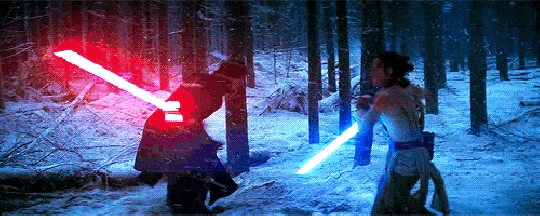
(My old post for reasons unknown got deleted😭)
One of my other favorite parts of this couple is that they are atypically gender reversed. It’s one of the many reasons this ship is so intriguing and unique compared to others. Let me explain. Typically in most hetero romances the man is the abrasive, closed off one at first and is generally a prickly little shit. While the girl is typically softer, a little more compassionate and open minded. This not the case with Rey and Kylo.
Rey’s first interaction with Kylo is shooting a blaster at him multiple times in succession. Granted she does have a Force vision of Kylo at Maz’s which makes her justifiably hostile and afraid of him. During the interrogation scene Kylo reads her mind and speaks her thoughts out loud: she wants to kill him. Rey calls him a creature in a mask and angrily tells him to get out of her head. And then proceeds to spit Kylo’s greatest fear back in his face with such venom. I love how she snarls: “You. You’re afraid.”
Kylo on the other hand only defends himself from her blasts and force stops her from shooting any further. He gently says: “The girl I’ve heard so much about.” Kylo easily could have dragged her away or thrown her into the hands of the troopers beside him—but instead he makes Rey sleep and scoops her up into his arms bridal style. In the interrogation room Kylo sees Rey’s fear and says she’s his guest. He takes off his mask. Then explains things calmly—never raising his voice above a murmur. The curiosity about her is strong as Kylo probes her mind and the responses to what he finds there are emotional. I love so much how he says “Don’t be afraid, I feel it too.” It just feels so incredibly kind considering the circumstances—like that was the first little glimpse of Ben we got.
The shift that happens when Rey uses the force back on Kylo is what really sets the tone for the rest of their relationship. Rey attacks and responds negatively—Kylo gently deflects and tries to connect. If you watch throughout the rest of the films this dynamic doesn’t really change. Almost all of their force bonds in TLJ are similar: Rey being barbarous and Kylo being benign. A majority of their saber fights are like this too—Kylo plays defense, is hesitant to pull out his saber multiple times or looks like he’s doesn’t want to fight her period.
See what I mean?! Rey is hostile and prickly—Kylo is open minded and gentle.
The other gender swapped aspect is that in a way Kylo is the damsel of this pairing. He’s trapped far away, lonely and miserable, in a figurative tower. Rey fights Luke for his cause and goes to rescue and save him if she can. But I also see Kylo as an emotional damsel too. He’s so lost, and hurt and twisted. Rey offers him a way back—she’s the only one who can—and in the long run is the very reason he is able to become Ben Solo again. But it’s when Rey lets her guard down and mellows her prejudice that their relationship flourishes. Kylo/Ben is already ready and waiting to love and be loved…
Man, this pairing is complex and fun to analyze!
#reylo#reylo fandom#reylo fam#reylo is canon#star wars sequel trilogy#kylo ren#ben solo#rey palpatine#rey skywalker#otp ship#star wars#adam driver#daisy ridley#reylo trash#ben solo x rey#rey x ben#rey x kylo ren#character analysis#star wars sequels#star wars meta#star wars universe
139 notes
·
View notes
Text

The big takeaway from Hyperspace Stories is that Kylo still feels the light so strongly that it completely blindsided him and beckoned him to go help someone he barely even likes.

He was so hyper fixated on this Force presence he felt that he was ready to kill for it, just for the Force to intervene and give him the sense that someone he was supposed to be working with was in danger.
This isn't the first time this has been shown to happen. It is also the only thing that Snoke can be referring to as the Light distracting him. If we go by the idea that the Light is inherently selfless and the Dark is selfish - him stopping what he was doing due to go help someone is a very Light sided thing to do.
Which is exactly what we know of Kylo. Someone struggling between the Light and the Dark, feeling it tear him in two ways. So much of his life had been given up for the Light, that selflessness in helping other, doing what others want for him, that his constant desire to do what he wants for himself (or believes he wants for himself, at least) is the only rebellion he has, and is his link to the Dark.
But despite being so entrenched in the Dark, despite being so strong in it, the Light still beckons him and he can't help but follow its call.
I also wonder a bit on this exact scenario - he used to teach at Luke's school. No doubt he went off on trips with students and no doubt he learned to keep a general feel of where the students were, making sure they were safe and not in trouble. Exactly the sort of skill that a teacher of the Force would use. This ability is probably so well honed that he can't turn it off, so Hux's ego-driven bullshit and that inherent Light sided selflessness dragged him from his desire in this moment.
The comic ends how this post begins, Snoke commenting on the Light in Kylo. Though interestingly, despite telling him he should have focused more on his own desire in the Dark and found out what the Force presence was instead of the Light sided need to help a comrade, Snoke is not aggressive about it. He seems accepting that this is a part of his student, almost resigned to it. Many times Snoke has used violence in his training of Kylo, but in this instance where Kylo has used the light, he simply tells him to try and snuff it out.
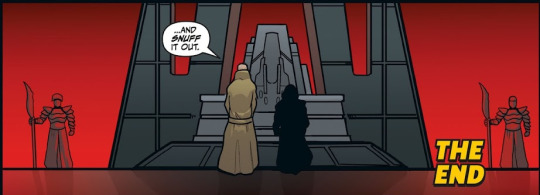
There is no anger here from Snoke at Kylo for not succeeding due to the Light, when Snoke has shown anger at Kylo for many other things.
#kylo ren#kylo ren meta#snoke#armitage hux#the force#star wars comics#star wars#hyperspace stories#ben solo#sequel trilogy#poor bubba perpetually fucked by the Force#also i really love how this comic leaned into Hux's ego#and love of his own voice#there's my hateful little nasty horrible space man#still the best look for kylo btw#that cinched waist#so gender non nonconforming#and yes i am saying that hux is like a child in this comic unable to do think about cause and effect#needing someone else to pull him out of a bad situation he got himself into#kylo meta
54 notes
·
View notes
Text
Hey! Did you like the Holdo Manuever from Epsiode 8 of Star Wars? ⬇️
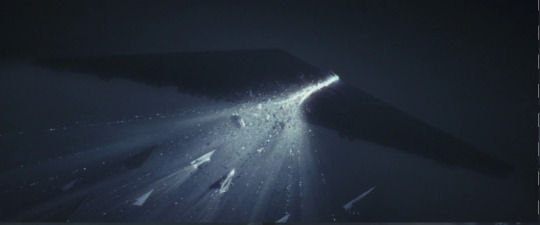
#it is stated in the movie that is a one in a million shot#I think if anyone could have made that shot it would have been a Jedi#but 🤷♀️#star wars#star wars sequel trilogy#star wars the last jedi#the last jedi#holdo manuever#vice admiral holdo#star wars meta
24 notes
·
View notes
Text
The characterizations for those first two Star Wars Sequels movies were Plain Good. Poe, Finn, and Rey were delightful to get to know! They were likeable people! It’s so nice to rewatch them and relive the fun of when Star Wars was coming out in theaters again.
Poe - In The Force Awakens, he’s a cocky hotshot who keeps making the hero-move against impossible odds. Sending his defenseless droid into a desert so he can take on the bad guys single-handedly? No problem. Fly a ship he’s never flown before with a Stormtrooper he just met to escape capture? Totally calm about that. He’s comfortable living in the moment and taking big risks. After all, he’s serving directly under Leia, Savior of the Galaxy, champion of the free world; he’s walking with giants, he’s got to act like it! And then in The Last Jedi he has to learn to stop doing that. Be a leader. Leaders look at the big picture, and focus on how to move forward instead of just saving the day in the moment. He can’t keep being cocky and reckless. Taking a stand against a Dreadnaught and facing down the First Order with cocky quips? Easy. But letting others make the sacrifice play while you live to lead, so the galaxy can go on hoping, and fight another day? Not so easy for Poe.

Finn - In The Force Awakens he’s a Stormtrooper who wants to run away from fights. He’s got a compassionate streak, sure; he doesn’t want to kill, and when he escapes, he likes to do it in the company of people who talk to him like he’s more than a number in an army list. But the point is, he’s out to save his own skin, and the skin of anybody who’s good to him. Then he learns to stop running and start fighting for something worthwhile. He starts to learn that by the end of that first movie when he’s running into danger and fighting for Rey. But it’s not until The Last Jedi that he understands: fighting isn’t the point. (And how great is that in Star Wars?) After all, even when he’s fought, it’s just to escape. He doesn’t really believe evil can be defeated—just escaped or sacrificed against. But in The Last Jedi, he learns to stop looking at it negatively, and start looking forward; don’t just fight for things that you love, or to hurt what you hate. Fight to save what you love. Actually focusing on what you love is what helps you to accomplish keeping it safe. It’s a stormtrooper learning about hope.
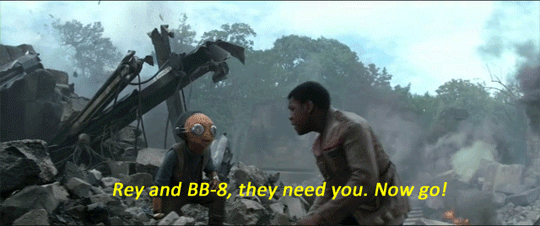
Rey - UAGH she’s a lonely soul who’s dedicated her whole life to having faith that her family will come back for her when you meet her in The Force Awakens. She hangs all her identity on that; she’s nobody, from nowhere, hoping that someone will come back and tell her who she is and that she’s loved. It doesn’t matter if a brave Resistance Hero believes she can help him, or if THE Smuggler Han Solo believes she can be part of his crew, or if a thousand year-old wise woman believes she could be the heir to the Luke Skywalker Legend—Rey can’t settle for their belief in her. She thinks she needs her parents’ belief in her to be somebody. But she learns that, even though her family isn’t with her, The Force is. And she needs to find belonging ahead, not behind. So her faith dips it’s toe into a new object—The Force— by the time you get to The Last Jedi. Then she’s still hoping to find out that she’s somebody who’s loved; maybe The Force can be her key to finding out about where she belongs and how she fits. She thinks it’s led her to remind Luke Skywalker of who he is by doing what he did; redeeming the bad guy. But she fails. And that’s all she really learns: that it’s not about her, and it never was, just like it was never about Luke. She doesn’t need to find her identity in where she comes from or who believes in her: she just needs to do the right thing for the future.
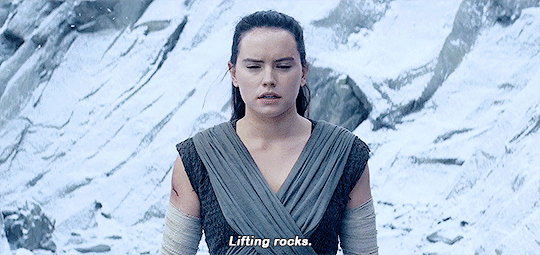
And we could talk about Kylo Ren but he gets a post of his own.
Point being, these movies had characters and a direction that were Plain Good and going somewhere, and if I go back and watch them, I remember how fun it all was
#Star Wars#sw#Lucasfilm#George Lucas#Disney Star Wars#Rey#Ben solo#Kylo Ren#the last Jedi#the force awakens#star wars sequel trilogy#Star Wars sequel#Star Wars sequels#analysis#meta#character analysis#Star Wars meta#Star Wars analysis#Finn#Poe#Poe Cameron#the first order#the Resistance#Luke Skywalker#sequel hate#Star Wars sequel hate#riann johnson#fn 2187#phasma#Hux
43 notes
·
View notes
Text
#starwars#star wars#starwars fandom#starwars prequels#original trilogy#star wars sequel trilogy#sw sequels#sw prequels#revenge of the sith#empire strikes back#new hope club#the clone wars#phantom menace#return of the jedi#last jedi#force awakens#rise of skywalker#rogue one#sw meta#starwars the clone wars#old republic#sw legends#sw eu#star wars legends#star wars prequels#luke skywalker#anakin skywalker#rey skywalker#darth vader#yoda
17 notes
·
View notes
Text
#star wars#sw#sw prequels#sw sequels#original trilogy#sw hc#sw headcanons#sw memes#sith order#sith#Darth Vader#darth bane#darth plagueis#darth sidious#darth sion#Darth vindican#darth zannah#pro jedi#anti jedi#sw meta
201 notes
·
View notes
Text
piggy backing on my thoughts in the tags of this post, I have to say I just don't understand the criticisms that the sequel trilogy is a poorly crafted story when it does character development better than the original six films.
This isn't necessarily a criticism — the original six films are more plot driven over character driven. The sequel trilogy, especially with The Last Jedi as the heart of the trilogy, is more character driven than plot driven. We have heard, from multiple actors, and can tell by looking at expanded material surrounding the films leading up to the Rise of Skywalker, that they had the characters arcs planned. They knew where they were going with their characters, if not the plot, because the plot was always set-dressing.
Majority of the character development in the Original Trilogy happens off-screen: Han goes from returning to save Luke to being more dedicated to the Rebellion in between movies. All of Luke's development from Jedi Knight to Jedi Master, happens off screen between Empire and Jedi.
And champion of the Star Wars fandom, Obi-Wan Kenobi, doesn't really get any on screen character development in the prequels besides having his life ruined. In fact, so little character development happens on screen, that we have had a total of three separate television shows to try and fill in the blanks and show us what we missed.
Contrast that to the sequels, which shows us that development, on-screen.
We get told and shown that Poe is a daring recklessly heroic person who wants to martyr himself and doesn't really think there's any other way to fight than killing himself. And then we get an entire movie deconstructing that, and in the next we can see he's taken those lessons to heart while being true to himself.
We spend three movies with Rey trying to avoid being the main character because of her crippling insecurity of who she is, and how little she values herself. The end result is the Jedi reaching out to her, Ben sacrificing himself to revive her, her having a family in the Resistance, and the Skytwins handing down their legacy/surname to give her the security of belonging that she's been seeking.
Finn arguably gets the worst treatment from a combination of racism/the fact that the writers just from the start didn't know what to do with his characters, but he inarguably goes from a man more focused on saving his own ass and thinking things are hopeless to a centered source of hope and inspiration to his friends and strangers alike?
And we're shown this, on screen. The only off screen development that happens is Rey and Poe's relationship, and they handle that so well just in the opening 20 minutes of the movie + there's so much narrative build up in TFA & TLJ for them, that it's not really noticeable? And Oscar, Daisy, and John do a phenomenal job through their acting decisions to craft a story of how this relationship has been forged in the last year, you only have to pay attention (the horror) to understand it.
There is so much to dig into with these films, and I'm really tired of them being written off as poorly crafted when they're not. They're some of the best of the franchise.
#nym speaks#sequel trilogy positivity#my meta#I don't always care about Rey or Finn's arcs as much just cos force arcs don't really appeal to me sometimes and neither does the Han#archetype arc so I'm more obsessed w poe and the resistance cos that's more up my alley but. Man#they're good movies I rlly think the issue is people wanted them to be driven by plot and they're not
3 notes
·
View notes